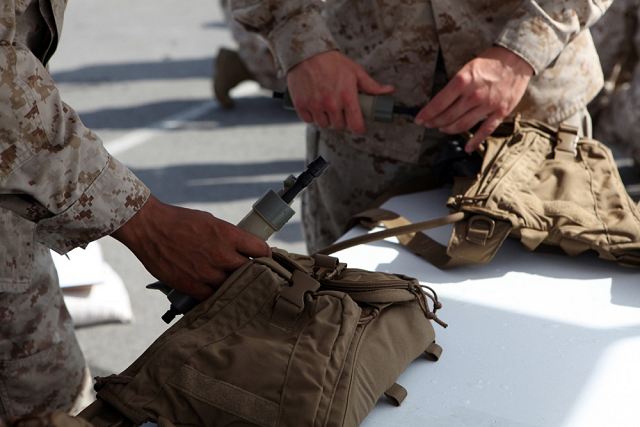New IWPS II Individual Water Purification System Block II for U.S. Marines 12301175
|
|
|||
|
Military Defense Technology - Individual Water Purification System
|
|||
|
|
|||
| New IWPS II Individual Water Purification System Block II for U.S. Marines. | |||
|
The U.S. Marine Corps is investing in a next-generation water purification system that will allow individual Marines to get safe, drinkable water straight from the source. The Individual Water Purification System Block II (IWPS II) is an upgrade to the current version issued to all Marines.
|
|||
|
|
|||
 Photo By Sgt. Amber Blanchard | Marines, with the 22nd Marine Expeditionary Unit, attach water filters to hydration systems for evaluation during an Experimental Forward Operating Base aboard Marine Corps Base Camp Lejeune, N.C., May 4, 2012. Photo By Sgt. Amber Blanchard | Marines, with the 22nd Marine Expeditionary Unit, attach water filters to hydration systems for evaluation during an Experimental Forward Operating Base aboard Marine Corps Base Camp Lejeune, N.C., May 4, 2012. |
|||
|
|
|||
|
Finding ways to make small units more sustainable to allow for distributed operations across the battlefield is a key enabler to the Marine Corps becoming more expeditionary. Developing water purification systems that can be easily carried while still purifying substantial amounts of water is part of that focus.
The current system was fielded in 2004 and used by small raids and reconnaissance units in remote environments where routine distilled water was unavailable. Since then, the system has been used in combat and disaster relief missions. With the new IWPS II, U.S. Marines are able to quickly purify fresh bodies of water on the go. The current system filters bacteria and cysts, but Marines still have to use purification tablets to remove viruses. That takes time – as long as 15 minutes for the chemical process to work before it is safe to drink. IWPS II uses an internal cartridge that effectively filters micro pathogens, providing better protection from bacterial and viral waterborne diseases. The new IWPS II will remove all three pathogens, filtering all the way down to the smallest virus that can be found. It can be also connect to Marines’ man-packable hydration packs. The IWPS II is expected to be fielded to Marines in fiscal year 2018. |
|||


























